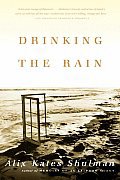 One of the things I love about used book sales is the chance of finding something wonderful for a dollar or two. Books that would otherwise remain hidden on library shelves or buried behind the newer offerings at bookstores can be picked out of a stack of chick lit* as easily as picking a fossil out of a gravel driveway. And that's how I found Drinking the Rain, a memoir by Alix Kates Shulman.
One of the things I love about used book sales is the chance of finding something wonderful for a dollar or two. Books that would otherwise remain hidden on library shelves or buried behind the newer offerings at bookstores can be picked out of a stack of chick lit* as easily as picking a fossil out of a gravel driveway. And that's how I found Drinking the Rain, a memoir by Alix Kates Shulman.Once again (and only after having read the book), I found that Amazon's "statistically improbable phrases" provided some good insight into content: strawberry goosefoot, dock seeds, sea rocket, lobster buoys. How could I not enjoy a book about a feminist author who spends the summer in a shack on a "nubble" of land on an island off the coast of Maine and teaches herself to forage for food? And why the heck is the word nubble not amongst the statistically improbable? I guess it wasn't paired with any other word regularly enough.
But there is a lot more to like about this short book. The language is clean and powerful and sensuous, and the story is engaging. It expands from an examination of solitude, fear, laziness and the pleasures of getting to know a place intimately, to a wider look at philosophy, New Age beliefs, activism, environmentalism and ecology, family, and female friendships.
Take Shulman's musings about her privy, for example:
Except on the rare still summer day, the single hole, freshened by ocean breezes, collects few foul smells, no flies....Whereas in the city, despite the most lavish bourgeois bathrooms, using the toilet is considered at best indecorous, using this privy is one of the day's most satisfying interludes....From this perfect bird blind of a privy, built on a platform with a protective roof and open front facing the sea, I can watch the swallows feeding their young in the rafters, or follow a marsh hawk glide in low easy loops around the nubble as it hunts field mice. From this pew I have marked the progress of the seasons in the flower-crammed brush: fiddleheads and berry blossoms in early spring, wild roses, nightshade, and touch-me-nots in summer, goldenrod and pale purple asters now, in fall. (p. 72).
You can't get much more down to earth than enjoying (and describing) your outhouse. And people who enjoy reading about food will like Shulman's passionate descriptions of collecting, cooking, and tasting all sorts of new foods - not just the wild greens and shellfish of her island. Her description of the farmer's market in Budapest, with its wild game, piles of multicolored and frilled mushrooms, desserts and terrines and tripe and goose livers - well, it's better than salivating over the food porn in magazines like Bon Appetit.
Shulman's approach to philosophy was similarly refreshing. At one point, she describes how she picked up an abandoned college textbook containing James Baldwin's "Notes of a Native Son" while waiting for her serviceberry pie to bake. This led her to consider her life in terms of "acceptance and resistance, contemplation and struggle....How can one live without rancor in a world steeped in suffering and injustice - or live without contentment in a world bathed in birdsong at sundown?" (p. 60).
I thought this passage was worth pointing out, since this issue comes up repeatedly while discussing motherhood (see for example this blog post from last year's Mothers & More Mother's Day campaign and the comments). "Can't you just enjoy being a mother?...Your children are little for such a short time," many women say. Or as Darla Shine might say, "Just stop whining". "Why dwell on the problems? Enjoy what you have."
Shulman eloquently points out how both philosophies can be encompassed in one world view, and in an individual:
...my acceptance and love of this life making passivity impossible. The more I love it the more I care about its fate, our fate, want to protect the suffering seas, the weeds, the air, the spawn, and each neglected old woman. But equally for me, the second is the cause of the first. For, from my first embrace of our soul-stirring movement at the dawn of my adulthood, fighting injustice was my main path into the world, my connection with each living soul, the way I came to write, to know myself, and to love the world." (p. 240-241).
And then Shulman ends her book, somewhat as she began, "in medias res, somewhere in the middle" - contemplating her outhouse and the world.
I'll be giving this serendipitous find a permanent place on my bookshelves. I'm just not sure whether to shelve it next to James Duke's Handbook of Edible Weeds or Zen and the Art of Motorcycle Maintenance.
*Not that I mind dipping into the pink stuff, but chick lit is pretty common and easy to find, unlike books like this one.




